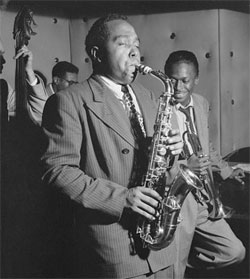
Introduction to Lesson 20
The word soul has its origins in the very nature or character of an individual. The soul is that ineffable part of a human being that some people understand as their core. Many people believe that the soul survives the physical body-the flesh, blood, bones, organs, and brain-and that it goes on to another plane of existence upon one's death. Just as the soul is understood to represent the essence of a given individual, soul music was understood, implicitly by some, explicitly by others, to express in some sense the very essence of Black culture.
Musicians first applied the term "soul" to the jazz style derived from the 1950s hard bopA style of jazz influenced by rhythm and blues, gospel music, and blues, with an emphasis on piano and saxophone playing, that originated in the mid-1950's. (an instrumental music style that combines elements of bebop-an instrumental style that focused on virtuoso soloists-with gospel and rhythm and blues styles). Sometimes designated "soul-jazz," a few of the style's earliest exponents were Horace Silver, Bobby Timmons, and Lee Morgan. In many senses, the increasing complexities of the bebop style practiced by musicians such as Charlie Parker and Dizzy Gillespie in the early and mid-1940s caused musicians such as Horace Silver and Bobby Timmons to return to the musical roots of Black culture. Consequently, soul-jazz drew extensively on techniques, gestures, and, at times, the repertoire of blues and gospel.
As the 1950s gave way to the 1960s, the Black community started using the term "soul" colloquially to refer to aspects of African American personality, style, or culture, as in "she's a soul sister," "he's got soul," "boy, that's soulful," and as a designation for down-home cooking, "soul food." In the 1960s, soul music came to designate various rhythm and blues musical styles and rooted mainly in Black gospel music. Soul music came to fruition at the turn of the decade, peaked in the mid-to-late 1960s, and by the mid-1970s was supplanted by funk and disco as the dominant styles of black popular music. This lesson will detail the forces that gave rise to soul music and made it unique from other popular music by and for African Americans at the time and explain the key features of the most prevalent forms of soul music.
A Change is Gonna Come
I was born by the river
In a little tent
Oh, and just like the river, I've been runnin'
Ever since
It's been a long
A long time comin', but I know
A change gon' come
Oh, yes it will
Long Walk to D.C.
It's a long walk to DC but I've got my walking shoes on
I can't take a plane, passer train, because my money ain't that long
America we believe, oh that you love us still
So people I'm gonna be under to wipe away my tears






